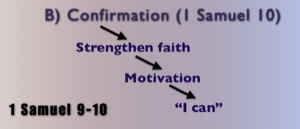
King Saul's Calling and Confirmation
1 Samuel 9-10
The Bible Teaching Commentary
_________________________
B. God’s Confirmation for Saul
to be King
1 Samuel 10
Paul J. Bucknell
A1. God's Calling (9) | A2. Questions on Calling | B. God's Confirmation (10)
Check Old Testament Library for powerpoints, audio/visuals and handouts.
“Then Samuel took the flask of oil, poured it on his head, kissed him and said, “Has not the LORD anointed you a ruler over His inheritance?” (1 Samuel 10:1).
1 Samuel 10:1 speaks of Saul’s actual anointing to be king. This confirmed God’s purpose for Saul and God’s readiness to equip Saul to be king. But actual rulership came only after the people saw the Lord choose him through the lot and his leadership in battle (1 Samuel 11).

Saul evidently needed God to very clearly demonstrate His grace to help Saul. From scanning over Saul’s life, we find that Saul had a lot of inferiorities to overcome in his life.
Saul’s Inferiority Complex
Saul apparently felt very inadequate. The scriptures writes about Saul’s father but little of Saul’s character (just outward). There are three reasons for this observation.
(1) The scriptures seem to indicate from his conversation with his uncle upon his return that he was very reluctant to say what happened. He told a half truth (1 Samuel 10:14-16) The scriptures clearly point this out.
(2) From 1 Samuel 10:22 we find that Saul was hiding behind the luggage. What does this mean? The reluctance to be known as king probably points back to a sense of inferiority or cowardliness in Saul.
(3) Later we see Saul scared silly from his foes. “When Saul saw the camp of the Philistines, he was afraid and his heart trembled greatly” (1 Samuel 28:5).
False humility sometimes occurs when a person neglects or holds back from his or her God-given assignment due to an inner fear. The fear becomes so powerful that it overshadows the response that God had prodded one to take. God had wonderfully worked in Saul’s life but he did not appropriate those many events so that he would obey the Lord.
So during the choosing of him of king by lots he hid in the luggage. Later he would offer up the sacrifice himself instead of waiting for Samuel.
Saul's Confirmation to be King
Saul’s confirmation in 1 Samuel 10 can best be seen in four parts. God was assuring him through various means that He would be there to help him rule.
1) Personal confirmation (1 Samuel 10:1-9)
Following verse 1 where Saul is actually anointed king, we find a whole sequence of prophetic events fulfilled. This was not just odd for us who are three millenniums separated by time but for them too.
Here are four prophecies made in 1 Samuel 10. Were they fulfilled?
“When you go from me today, then you will find two men close to Rachel’s tomb in the territory of Benjamin at Zelzah; and they will say to you, ‘The donkeys which you went to look for have been found. Now behold, your father has ceased to be concerned about the donkeys and is anxious for you, saying, “What shall I do about my son?”’” (1 Samuel 10:2).
“Then you will go on further from there, and you will come as far as the oak of Tabor, and there three men going up to God at Bethel will meet you, one carrying three kids, another carrying three loaves of bread, and another carrying a jug of wine; and they will greet you and give you two loaves of bread, which you will accept from their hand.” (1 Samuel 10:3, 4).
“Afterward you will come to the hill of God where the Philistine garrison is; and it shall be as soon as you have come there to the city, that you will meet a group of prophets coming down from the high place with harp, tambourine, flute, and a lyre before them, and they will be prophesying.” (1 Samuel 10:5).
“Then the Spirit of the LORD will come upon you mightily, and you shall prophesy with them and be changed into another man.” (1 Samuel 10:6).
The Lord states that all the signs were fulfilled. “Then it happened when he turned his back to leave Samuel, God changed his heart; and all those signs came about on that day.” (1 Samuel 10:9).
How amazing it is that God would list four separate events in such detail. Our question here is why does God do it this way?
From 10:7, what would you think the purpose of these signs were for?
“And it shall be when these signs come to you, do for yourself what the occasion requires; for God is with you” (1 Samuel 10:7).
Samuel had no doubt about these signs occurring. He said, “When these signs come to you…” These signs were primarily for Saul himself. Again, we need to see that Saul needs to be equipped. God was training Saul in a short time for the position of king.
The signs probably were given to establish beyond a question of doubt that God was behind him and would bring about victory. Saul’s fearful responses derived from a preoccupation on himself rather than on the Lord’s promises. (This is further seen in the command given to Saul in 10:8 and his problem with disobedience in chapter 13. There is a gap here but not much in time).
God strengthens us
The main principle we find here is that God will help us according to our need. When God appoints, we can trust Him to equip us for the work involved. Pay close attention to what He does, says or causes to happen around you at that time.
As with Saul, nothing happened by accident, whether it was the group of prophets that he met or the Holy Spirit mightily coming upon him. The preparations increase our sense of direction, participation and confidence from God.
All that happened to Saul was to confirm that God was with him. In other words, God would be there to help Saul in no matter what difficult situation that faced. This was to increase his faith for the assignments ahead. Like always, it would not be Saul but God with Saul that would transform things.
“God is with you!”
God was with Saul. God would empower him to succeed. This promise is awesome. But just think, the same is true with Christ followers. Jesus said all authority was His and that He appointed them (His disciples) to make disciples.
“Teaching them to observe all that I commanded you; and lo, I am with you always, even to the end of the age” (Matthew 28:20).
God does not send us powerless into our lives. We should be mindful that the chief purpose the Lord has in our lives is to establish our faith in Him. This pretty much enables us to overcome all sorts of temptations and troubles that we might face in life. This also helps us face our tasks of making disciples in such a way that we know He will help us in this task.
2) Spiritual confirmation (1 Samuel 10:9-13)
Two significant spiritual experiences happened to Saul. Saul’s heart was changed and the Spirit of God came upon Saul in a mighty way so that he spoke and acted like a holy prophet.
“Then it happened when he turned his back to leave Samuel, God changed his heart; and all those signs came about on that day.” (1 Samuel 10:9).
What does it mean that God ‘changed’ his heart. Does it simply mean that God made him more positive about his situation? No. There was a deep change in his life. The word ‘changed’ means to be transformed or overtaken. This is best understood to refer to a new heart or being ‘born again.’ Regeneration is the technical word that describes this change in a person’s heart where once he only focused on one’s own life but afterwards would genuinely be concerned for God’s person and work.
One might question whether this was genuine. I believe it was, but he allowed his fear to take hold of his life and did not trust the Lord. He chose to trust in what he thought was right even though he was very inexperienced. There are some hard things to reconcile with Saul’s life, but perhaps the warning we can take is to be careful of sliding back away from the Lord for without abiding in the Lord, we will carry out the deeds of the flesh.
3) Family confirmation missing (1 Samuel 10:14-16)
God perhaps would also have confirmed this calling through his uncle, but Saul purposely hid what God was doing.
“So Saul said to his uncle, “He told us plainly that the donkeys had been found.” But he did not tell him about the matter of the kingdom which Samuel had mentioned” (1 Samuel 10:16).
I used to feel awkward telling my parents what really was going on. I was always suspicious if they knew, then it would embarrass me. I have since learned that I should have trusted them more. God works through our parents. This is the reason I state above that the Lord perhaps would have again confirmed Saul’s calling if he would have been honest. Our deceitful ways never really work as we think.
4) National confirmation (1 Samuel 10:17-27)
“Then he brought the tribe of Benjamin near by its families, and the Matrite family was taken. And Saul the son of Kish was taken; but when they looked for him, he could not be found.” (1 Samuel 10:21).
Samuel called all the people together and by lot had Saul chosen! Remarkable confirmation. This sign in and of itself is absolutely convincing. Out of hundreds of thousands, one man is chosen.
Samuel did preface this whole selection with some heavy words.
“And he said to the sons of Israel, “Thus says the LORD, the God of Israel, ‘I brought Israel up from Egypt, and I delivered you from the hand of the Egyptians, and from the power of all the kingdoms that were oppressing you.’ “But you today rejected your God, who delivers you from all your calamities and your distresses; yet you have said, ‘No, but set a king over us!’ Now therefore, present yourselves before the LORD by your tribes and by your clans.”” (1 Samuel 10:18, 19).
These words are not any different from before in chapter 8. “They have forsaken Me and served other gods…” (1 Samuel 8:8).
Is it possible that Saul’s cowardly response, quite contrary to God’s remarkable signs, somehow brought trouble upon himself? By acting cowardly, we could easily imagine how he might have instigated some men to look down on him and think he was not worthy to be king.
“But certain worthless men said, “How can this one deliver us?” And they despised him and did not bring him any present. But he kept silent” (1 Samuel 10:27).
Conclusion
God did not simply appoint Saul and expect him to go into battle and win. Our misconceptions of calling or spiritual warfare might have us make such conclusions but they need not. We are not to go out in our own strength. Saul did not have to fight or lead himself. The battle is the Lord’s.
We must ascertain what God calls us to do and then follow through. Having direction, though, perhaps, is not the most difficult part. Like in Saul’s case, it happens with surprise.
There will, however, be difficulties to complete the task. God allows us to face impossibilities. Again, this is true in Saul’s case too. He the farmer boy chasing after donkeys is now to be the first king of a whole new dynasty. It is here, however, that we can experience the abounding grace of God which strengthens and empowers His people to accomplish God’s good and perfect will.
Continue -> Check out short video on God's will or audio for 1 & 2 Samuel 9-10 or check out the BFF Bible study on 1 Samuel 9-10.







